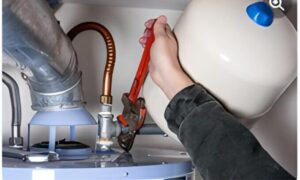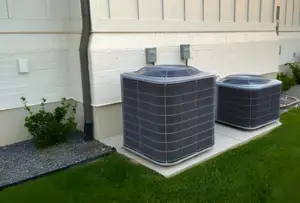Welcome to the world of furnace nightmares, where troubleshooting tips and professional help are essential for maintaining the optimal performance of your heating system.
As the temperatures drop and we rely on our furnaces to keep us warm, it can be disheartening to encounter unexpected issues. From problems with turning on to insufficient heat and malfunctioning thermostats, these challenges can leave homeowners feeling frustrated and seeking solutions.
In this discussion, we will explore common furnace problems, provide troubleshooting tips, and stress the importance of professional assistance in certain situations.
So, if you've ever wondered how to tackle furnace nightmares and ensure a cozy home, keep reading.
Understanding Your Furnace
Furnaces, whether fueled by natural gas or propane, are essential heating systems that utilize various components such as burners, heat exchangers, blowers, and thermostats to efficiently warm the air in homes and buildings.
Electric furnaces are less common but also function in a similar manner. Understanding the main components of a furnace is crucial for troubleshooting and maintenance. Regular upkeep is necessary to ensure proper functioning, especially for older furnaces that are more prone to breakdowns.
Common problems include furnaces not turning on, frequent cycling, and inadequate heating. Troubleshooting these issues involves checking the thermostat, filter, blower motor, flame sensor, ignitor, limit switch, and wiring.
However, for complex issues and concerns related to gas lines and electrical components, it is advisable to seek professional help to ensure safety and proper repairs. Regular professional maintenance is also recommended for optimal furnace performance.
Common Furnace Problems
Understanding the inner workings of a furnace is essential for troubleshooting and maintenance, especially when faced with common problems that may hinder its optimal performance. Here are some common furnace problems you may encounter:
- Furnace won't turn on: Check thermostat, batteries, and circuit breaker.
- Frequent cycling: Check filter, thermostat, and blower motor.
- Furnace doesn't heat: Clean flame sensor, check ignitor and limit switch.
- Malfunctioning thermostat: Replace batteries, check wiring.
These problems can often be resolved with simple DIY solutions. However, if the issues persist or if you encounter more complex problems such as a cracked heat exchanger or failed blower motor, it is important to seek professional help. Gas line and electrical component issues should always be handled by professionals to ensure safety and proper repairs. Regular professional maintenance is also recommended to maintain optimal furnace performance.
Troubleshooting Furnace Issues
When troubleshooting furnace issues, it is important to systematically identify and address potential problems to ensure optimal performance and functionality. Some common problems include:
- No heat or insufficient heat
- The furnace not turning on
- Frequent cycling
- Blower continuously running
- A noisy furnace
To troubleshoot these issues, start by checking:
- The air filter
- The thermostat
- The circuit breaker
- The ignitor
- The limit switch
- The blower motor
Cleaning the flame sensor and ignitor, replacing batteries, and checking the wiring may also be necessary.
However, it is important to note that some problems are best left to professionals, especially those involving gas lines and electrical components. Professional help can ensure safety and proper repairs. Regular maintenance by professionals is also recommended for optimal furnace performance.
Troubleshooting Furnace Issues (continued)
To further address potential furnace issues, it is essential to continue troubleshooting with a focus on specific components and potential malfunctions. Here are some common furnace problems and their troubleshooting steps:
- Cracked heat exchanger: This is a serious issue that can lead to carbon monoxide leaks. It requires immediate professional help.
- Failed condensate pump: Clean the drain line and check the float switch for any obstructions.
- Failed blower motor: Inspect the motor, capacitor, and wiring for any signs of damage or malfunction.
- Failed ignitor: Clean the ignitor and check the control board for any issues.
Importance of Professional Help
Professional help is crucial when it comes to troubleshooting and resolving complex issues with your furnace. While some problems can be tackled with basic troubleshooting, others require the expertise of a trained professional. Gas line and electrical component issues, for example, should always be handled by professionals due to the potential risks involved.
Professionals not only possess the knowledge and skills necessary to diagnose and repair these issues, but they also have access to specialized tools and equipment. Additionally, professionals can ensure safety and proper repairs, minimizing the risk of further damage or accidents.
Regular professional maintenance is also recommended for optimal furnace performance, as professionals can identify potential problems before they escalate. When it comes to your furnace, don't hesitate to seek professional help for complex issues to ensure the longevity and efficiency of your heating system.
Regular Professional Maintenance
Regular professional maintenance is essential for ensuring the optimal performance and longevity of your furnace. By scheduling regular maintenance with a professional technician, you can prevent potential problems and keep your furnace running smoothly. Here are four reasons why regular professional maintenance is crucial:
- Inspection and cleaning: A professional technician will inspect and clean your furnace, removing any dirt, debris, or buildup that can hinder its performance.
- System efficiency: Regular maintenance helps to optimize the efficiency of your furnace, ensuring that it operates at its highest level, saving you energy and money.
- Safety checks: A professional technician will conduct safety checks to identify any potential hazards, such as gas leaks or faulty electrical components, keeping your home and family safe.
- Extending lifespan: Regular maintenance helps to extend the lifespan of your furnace, reducing the need for costly repairs or premature replacement.
Frequently Asked Questions
How Do I Know if My Furnace Is Using Natural Gas or Propane?
To determine if your furnace is using natural gas or propane, you can check the fuel source indicated on the furnace itself or consult the furnace's documentation. If unsure, it is best to contact a professional for assistance.
Can I Use an Electric Furnace Instead of a Gas Furnace?
Yes, you can use an electric furnace instead of a gas furnace. While less common, electric furnaces are an alternative option for heating your home. Professional help may be needed to install and maintain an electric furnace properly.
What Should I Do if My Furnace Is Emitting a Strange Odor?
If your furnace is emitting a strange odor, it is best to contact a professional for assistance. Strange odors could indicate a potential gas leak or other hazardous issues that require immediate attention by a qualified technician.
How Often Should I Replace the Air Filter in My Furnace?
It is recommended to replace the air filter in your furnace every 1-3 months, depending on factors such as air quality and frequency of use. Regular filter replacement ensures proper airflow and efficient furnace performance.
Is It Normal for My Furnace to Make a Humming Noise While Running?
It is not normal for a furnace to make a humming noise while running. This could indicate a problem with the blower motor, fan belt, or other internal components. It is recommended to consult a professional for proper diagnosis and repair.
Conclusion
In conclusion, understanding the main components of a furnace and being aware of common problems can help homeowners troubleshoot and address issues effectively.
Regular maintenance is crucial, especially for older furnaces, to ensure optimal performance.
While some problems can be resolved independently, seeking professional help for certain issues, particularly those related to gas lines and electrical components, is essential for safety and effective repairs.
By following troubleshooting tips and knowing when to seek professional assistance, homeowners can maintain their furnace's performance and enjoy a warm and comfortable home.








